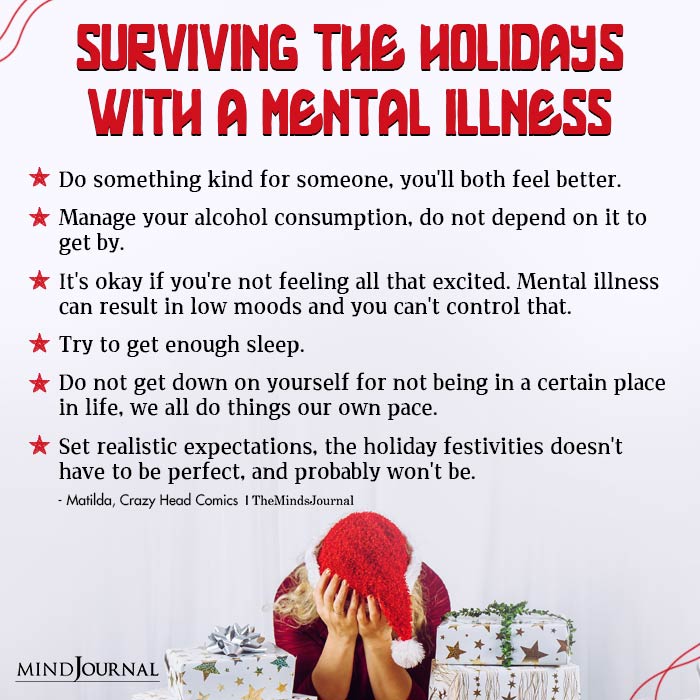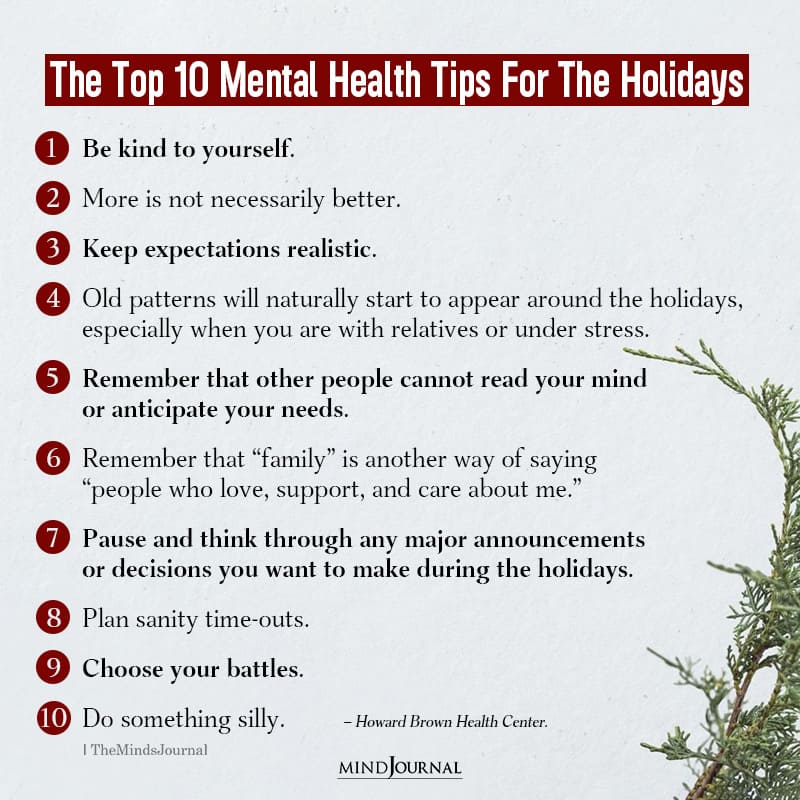Christmas is that time of the year when laughter, warmth and family is what we bask in. The streets shimmer with festive lights, there’s delicious food all around us, and the air is filled with the melodies of carols. Still, many people during this time fight their own internal battles and deal with mental health problems. So what is the connection between mental health and Christmas?
Christmas can be a tough thing to deal with if you are someone struggling with your finances, feeling lonely or have lost someone close to you. Moreover, the societal pressure to feel joyous and participate in numerous social gatherings can be pretty overwhelming.
Sometimes, you may feel inadequate as a result of comparing the perfect holiday you idealize and your personal experiences that do not meet these ideals.
So, what can you do to take better care of your mental health at Christmas? Let’s explore that, shall we?
Related: How To Cope With Anxiety And Depression During Christmas: 14 Ways To Bring Some Cheer
Mental Health And Christmas: 6 Tips To Keep Your Mind Merry and Bright
1. Stick to your routine.
Maintaining a routine can be tricky in winters due to dark mornings and the temptation of staying in your bed and under the covers for the whole day. However, it is important to try and maintain your regular routine, especially if you are still working from home.
I know it’s hard, but building a daily structure can give you some stability and reassurance in during the holiday season. Put an alarm, coax yourself up gently from the warmth of your duvet covers, and create a morning routine that makes you happy and energized and prepares you for the day ahead.
Remember, be kind to yourself and take it one day at a time. Your well-being is important and by following a schedule, you are taking the right steps toward nurturing your mental health and yourself.

2. Express how you feel instead of supressing yourself.
Are you wondering how is mental health and Christmas related, and what can you do to take better care of your mental health at Christmas?
It’s difficult to acknowledge that you are not feeling happy and excited during the holiday season, when it’s supposed to be the happiest time of the year. Talking about your feelings can help you feel lighter, can help in lifting your spirits up and enable you to cope better whenever things feel tough.
This is a very important part of taking care of your mental health at Christmas. Taking charge or ‘self managing’ and doing what you can to stay healthy is one of the best things you can do for yourself.
3. Don’t feel bad about saying “no”.
The holiday season means getting a ton of invitations to Christmas parties. Even though it might feel exciting sometimes, other times, it can also feel overwhelming. You may find it hard to say “no” because you don’t want to come across as unsocial and boring.
However, it’s okay if you don’t feel like attending parties and get-togethers throughout the holiday season. Let’s be honest, parties can be really tiring, and the constant socializing can become overwhelming after a point. Taking a break or spending some time alone at home can be rejuvenating and can help your recharge your social batteries.
Saying “no” is sometimes the best thing you can do for yourself and your mental well-being. Be kind to yourself and focus on taking better care of your mental health at Christmas this year. You will thank yourself later.
Related: 9 Tips For Coping With Holiday Stress And Depression
4. Don’t go overboard with alcohol.
Many people turn to alcohol during the holiday season to deal with loneliness and fear. However, it’s important to remember that alcohol can only numb you to your feelings and serves as a temporary distraction and nothing more.
Even though drinking with your buddies and loved ones can be a enjoyable, try not to go overboard with your drinking; don’t make alcohol the only “fun” factor. Be mindful of your limits, so that your personal well-being is not compromised.
It’s crucial that you take care of yourself, so that you can build and nurture healthy relationships in your life. Don’t be too hard on yourself during this festive time, and try to make the right choices when it comes to your mental and emotional health during Christmas.
5. Make a Christmas playlist.
When it comes to your mental health and Christmas, this is one of the most underrated things you can do for yourself.
During the holiday season, making a Christmas playlist can be so uplifting. Dopamine, the feel-good chemical in your brain, can easily be released through music as research has shown. In addition to better sleep and mood enhancement, it reduces depression and stress and even improves motivation with memory.
Bring comfort and joy into your environment by creating a playlist that is filled with all your favourite holiday songs. Soothe your soul with music that makes your heart sing and let the power of music accompany you throughout this Christmas season.

6. Stay active as much as you can.
One of the best and easiest ways to deal with your deteriorating mental health at Christmas is to stay active. Exercising regularly releases happy chemicals in your body that work towards uplifting your mood and makes you feel positive and happy.
Additionally, it also improves your self-esteem, helps you sleep better, aids concentration and improves your well-being overall. Working out regularly doesn’t just make your body healthier, it also makes you brain and other vital organs in terrific working condition.
Christmas is a time to indulge, but don’t put your body through the wringer in the name of “fun” and “enjoyment”. Embrace the Christmas spirit to the fullest, but also prioritize your mental, emotional and physical health.
Christmas can be a really meaningful and beautiful time of the year, but at the same time, it can also be emotionally taxing and challenging for many people. If you are one of those people, then keep these strategies in mind, and take the best care of your mental health at Christmas.
Related: 24 Simple Self-Care Ideas For The Holidays and Beyond
Which of the strategies struck a chord with you? Do you think personally think mental health and Christmas are connected? Do let us know your thoughts in the comments down below!









Leave a Reply
You must be logged in to post a comment.